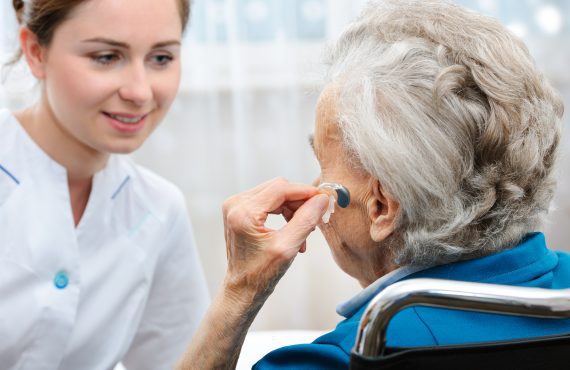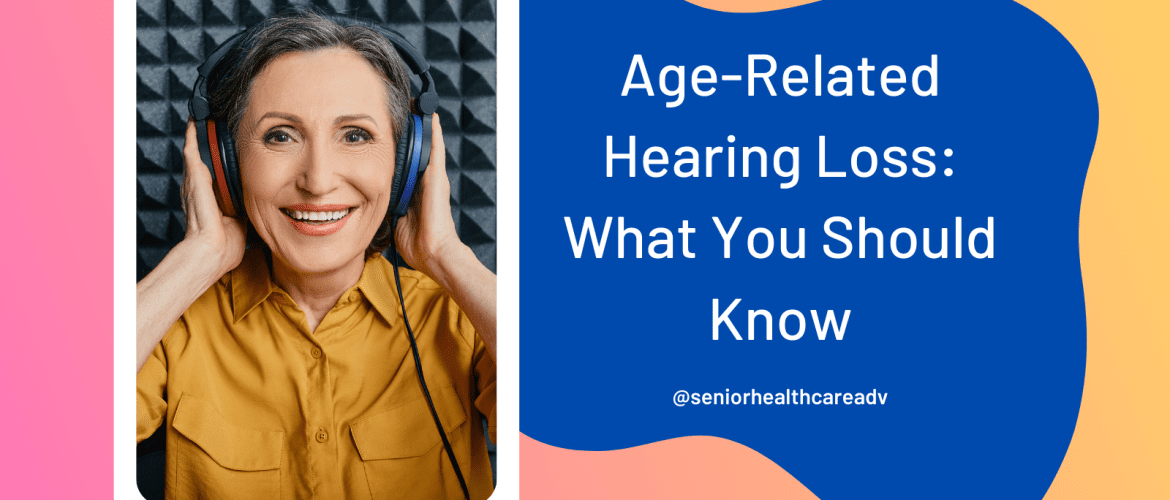Age-Related Hearing Loss: What You Should Know
Gradually diminishing hearing or age-related hearing loss is a common problem for individuals over 65. It is a condition referred to as presbycusis and one out of every three older adults experience some level of hearing loss. Because it is so gradual, the person may not even be aware of the issue until someone else points it out or realizes the frequency of asking “What?” increases.
Hearing loss is not a reversible condition. If you suddenly experience hearing loss, seek help from your health care provider immediately. Also, do your best to limit your exposure to continuous loud noises.
Hearing loss usually affects hearing high-pitched noises, such as the microwave beeping or the telephone ringing.
Hearing loss can make a person feel isolated and misunderstood. Often, there is a sense of shame associated with being hard of hearing. Some individuals who cannot hear well can be misdiagnosed with dementia because they don’t report the hearing loss and misunderstand conversations. Going out for a family dinner and not hearing the discussions can lead to frustration and depression. Family members may have to raise their voices regularly, leading to a sense of chaos within the home.
Seniors who have hearing loss can start to confuse similar-sounding words or end up guessing based on what they think the words may be, and often they are wrong. Since the person with hearing loss tends to respond in ways that are not harmonious with the other person’s statement, they can be misunderstood as having dementia.
Family members must know that speaking louder does not help the situation, but speaking lower and slower can help.
Research has shown that listening to music can help the hearing impaired.
What Causes Age-Related Hearing loss?

There are various reasons for age-related hearing loss. Most commonly, it occurs because of changes within the middle and inner ear or along the brain’s neural pathways. Constant exposure to loud sounds such as work-related noise or loud music can also contribute to hearing loss. Diabetes and heart disease and the side effects of certain medications, such as antibiotics and aspirin, have also contributed to hearing loss in seniors.
What are the Symptoms of Age-Related Hearing Loss?
The symptoms of age-related hearing loss may look like other medical problems or conditions. Always consult your healthcare provider for a diagnosis.
Other people speaking can sound slurred or mumbled
A letter such as “th” and “s” and high-pitched noises are hard to distinguish
Can’t understand conversations when there is noise in the background
Womens’ voices are more difficult to understand than men’s
Some sounds can be irritating or seem overly loud
Ringing in the ears (Tinnitus) can occur.
📚 Related: Does Medicare Cover Hearing Aids
How is Age-Related Hearing Loss Diagnosed?
Your doctor uses a lighted otoscope to examine your eardrum and ear canal, looking for any damage, inflammation, blockage, infection, or impacted ear wax. You may also be prescribed an audiogram to assess the problems or the degree of hearing loss you are suffering. After which, you may be referred to an audiologist or hearing specialist.

Hearing Loss Treatment?
Your doctor will assess the following:
Your age
Medical and overall health history
Severity of problem
Medication history
Your preference
Treatment options include:
- Hearing aid
- Amplifiers, speech-to-text technology, and other assistive devices
- Speech therapy
- Wax buildup prevention techniques
Hearing loss prevention:
- Avoid exposure to loud noises
- Wear ear muffs or earplugs to prevent worsening of your hearing
Helpful tips to get the best understanding from your doctor visit:

#1. Write down all questions before your visit.
Ask someone to accompany you to the doctor, so you are sure to get all of the information and write down important facts.
At the visit, write down the names of new medicines, treatments, or tests and any new instructions your provider gives you. If you have a follow-up appointment, write down the date, time, and purpose for that visit.
📚 Related: Does Medicare Cover Hearing Aids?
#2. Describe Your Symptoms Clearly:
Be specific about your hearing difficulties. Explain when and how you notice hearing loss, such as in noisy environments or during conversations.
#3. Ask for Hearing Tests:
When discussing your age-related hearing loss with your doctor within the context of Medicare Advantage, inquire about the coverage and options for hearing tests. Many Medicare Advantage plans offer coverage for hearing exams, making it easier for you to address your hearing concerns without incurring significant out-of-pocket expenses.

***Disclaimer: This is for educational purposes only and is not intended to replace the advice of your doctor or other health care provider. We encourage you to discuss any further questions or concerns you may have with your provider.***
What Our Clients Are Saying
“Wonderful organization. Very Honest, caring, and professional. I would definitely recommend them to family and friends.”
“We have had a hard time finding insurance, as many others might have been doing recently. Finding SHA now was literal lifesaver..”
“There just aren't enough stars on this page for Danny - he went above & beyond to help us. He returned every phone call & answered every question we had.”



